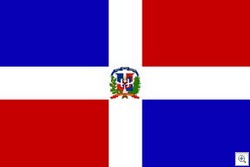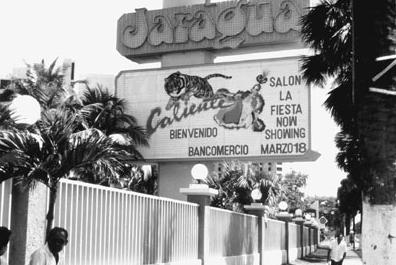 The Dominican Republic shares the Greater Antilles island of Hispaniola with Haiti, with which it has shared many attributes, especially an impoverished condition. In the early 1800s, the country was ruled in succession by French, Spanish, and Haitian military forces. When not ruled by foreign forces, the Dominican Republic has suffered at the hands of indigenous dictatorial rule as well as having been dominated by commercial interests of the United States, aided by the U.S. military. During the rule of strongman Raphael Trujillo (1930–1961), foreign casino interests established properties that were essentially governed by the dictator, largely for his benefit as well as that of the owners. The years from 1961 to 1966 were turbulent and unstable. In 1965 U.S. troops invaded as a measure to preserve order and preclude intervention by Cuba. The troops left in 1966, and the stage was set for the installation of a democratic government. Democracy has survived over the remaining years of the twentieth century and into the twenty-first century.
The Dominican Republic shares the Greater Antilles island of Hispaniola with Haiti, with which it has shared many attributes, especially an impoverished condition. In the early 1800s, the country was ruled in succession by French, Spanish, and Haitian military forces. When not ruled by foreign forces, the Dominican Republic has suffered at the hands of indigenous dictatorial rule as well as having been dominated by commercial interests of the United States, aided by the U.S. military. During the rule of strongman Raphael Trujillo (1930–1961), foreign casino interests established properties that were essentially governed by the dictator, largely for his benefit as well as that of the owners. The years from 1961 to 1966 were turbulent and unstable. In 1965 U.S. troops invaded as a measure to preserve order and preclude intervention by Cuba. The troops left in 1966, and the stage was set for the installation of a democratic government. Democracy has survived over the remaining years of the twentieth century and into the twenty-first century.
The legislature of the Dominican Republic formalized a set of rules for casino operations in a law that was passed in 1968. Under the 1968 law, the casinos must be in top-rated tourist hotels that have 200 rooms. Exceptions were made for two casinos in smaller hotels that had been operating before 1968. All licensed hotels since the law was passed are in larger hotels that market their rooms to foreign tourists.

The Jaragua Casino of Santo Domingo features major Las Vegas style shows.
The 1968 act outlawed slot machines. Slot machines had operated in casinos before that time; however, the government felt that the machines appealed too much to poorer local residents, who did not have the resources to meet minimum play requirements of the table games. The machines were permitted to come into the casinos with a new law passed in 1988; however, the government imposed a higher tax on machine wins than on other wins. The government wished to encourage the casinos to have only higher-denomination machines (one dollar per play or more) rather than nickel and dime machines that would appeal to the poorer people. In contrast, poorer people can purchase passive lottery tickets each week in order to satisfy their gaming urges. Besides that, the lottery directs its profits to programs for the poor and also employs many poor people to sell the tickets.
The casinos have two sets of books, one for play in U.S. currency and the other for play in Dominican currency. There is no currency exchange. There are two sets of chips – U.S. and Dominican. There are also specifically designated chips for credit play. This provision for special chips enables the casino to ensure that loans are repaid at the time a winning player would be “cashing-in”. The casinos follow two methods of taxation. For casino wins in Dominican currency, the casinos pay a tax of 20 percent on the gross win. For players using chips valued in U.S. dollars, the tax is paid when the chips are purchased. It is a 2 percent drop tax; that is, for each $100 of chips purchased, the casino pays $2 in tax. There is no win tax. The casinos are reluctant to offer credit to players, especially local players. They had a history of players refusing to pay back the casino owners who, for the most part, are foreigners – usually Americans (see Honduras for a discussion of the same problem). Locals have considered it an affront to be challenged in court by “rich foreigners” for repayment of money they have “already returned” to the casinos via their losing play. Therefore, the casinos contract with local residents who will “guarantee” repayment of the loans. If the player loses and does not repay the loan in a rapid fashion, the casino asks the guarantor to collect the loan. The guarantor then pays 70 percent of the loan and is given the right to collect the entire loan and to keep the 30 percent differential as a commission. The guarantor is also empowered to take the loan obligation to court, where he is well acquainted with the judicial personnel and is not subject to antiforeign accusations.
There are several premium casinos in Santo Domingo, the capital city – a city that was settled by Bartholemew Columbus, the brother of the explorer. The leading casino is the Jaragua, which is owned by Americans. It features a Las Vegas–style floorshow and a set of fountains that was designed by the architect who designed the fountains at Caesars Palace. Koreans own the next leading property, which is located at the Embajador Hotel. Most of the dealers in these facilities are citizens of the United States, and many have had experience in Las Vegas casinos. There is no restriction on such foreign labor. Other major casinos are in the Sheraton, Concorde, Lina, and Centanario hotels. Altogether, there are a dozen hotels in the Santo Domingo area.
Santo Domingo is a historical city that should appeal to a tourist with a craving for evidence of the founding of the oldest European-settled city in the hemisphere (1496) and a desire to see buildings still standing at the oldest university in the hemisphere (founded in 1538). Most casino-oriented tourists, however, like things such as beaches and room amenities. Santo Domingo falls short. It has no sandy beaches, and its electrical supply is challenged. Every day the power in the hotel—casino and rooms—goes out for some time. The casino keeps essential functions going with backup facilities; however, tourist facilities such as Jacuzzis, television, restaurant areas, and telephones temporarily go down. For tourism, however, the Dominican Republic is fortunate to have another location with ample power and with top-class natural beaches – the north island shore called Puerto Plata. Its golden beach extends for nearly sixty miles. Several new casino hotels have been constructed in Puerto Plata within the last decade, the leading one being a Jack Tar facility with 300 rooms and a 40,000-square-foot casino area.
The Dominican Republic competes with Puerto Rico for casino players – each has its advantages and disadvantages. In Puerto Rico, English must be spoken at the casinos, whereas it is not mandated in the Dominican Republic. Puerto Rico has superior airline service, whereas the Dominican Republic has limited direct flights to the United States. On the other hand, labor costs are much lower in the Dominican Republic, which translates into lower hotel costs for tourists—and lower costs for casinos that are offering free rooms to players. The other advantage of gaming in the Dominican Republic is shared with other Caribbean venues: No reports are given to the Internal Revenue Service of the United States regarding players activities – how much they wager and how much they win.
The Dominican Republic was one of the first offshore jurisdictions to enter the market for sports bettors. They now offer bets through telephone service as well as over the Internet.